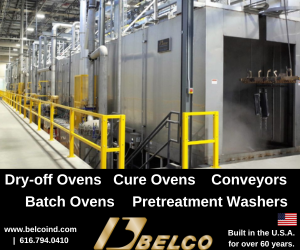Painting Plastics
Question: I work for a coatings supplier.
Question:
I work for a coatings supplier. My company is currently working with a large OEM that manufactures fiberglass pultrusions. The customer wants to paint the substrate with a high performance water base coating but is having problems with adhesion on the surface. The customer wants to discontinue the use of acetone wiping and solvent painting for numerous reasons. Our paint has demonstrated all the performance characteristics required but, since the fiberglass has a styrene residue on the surface, the coating is losing adhesion. We have determined that a flame process will work, but the customer would like to use a multi-stage washer "if possible. Is there a cleaning process available that is environmentally friendly and cost-effective? K.H.
Answer:
For the record, acetone wiping is the worst kind of pretreatment for two reasons. First, acetone dries too fast to be an effective cleaner. Second, because of its low flash point, it is too dangerous. Other slower evaporating solvents are more effective and safer. As far as discontinuing use of solvent containing paints, your customer may not have a choice because of air quality standards.
Since my former employer owns the intellectual property, I can't quote you chapter and verse about the pretreatment process. However, I can tell you that when we made pultruded third rail covers for the transportation industry, special care had to be taken to pretreat the substrate prior to painting the pultrusions. At that time, we were applying conventional paints that were not as finicky as waterborne paints.
There are materials other than styrene residues on the surface of pultrusions. These materials protect the dyes and act in a similar manner to mold release agents. They are incorporated in the pultrusion resin formulation. It is these materials that must be removed during pretreatment to ensure paint adhesion. My recommendation is to contact suppliers of aqueous cleaners for pretreating metallic and plastic substrates prior to painting. Indeed, aqueous alkaline cleaners and detergent cleaners will remove surface contaminants, but first you must identify and convey the exact chemical nature of these materials to the pretreatment supplier.










.jpg;maxWidth=300;quality=90)




